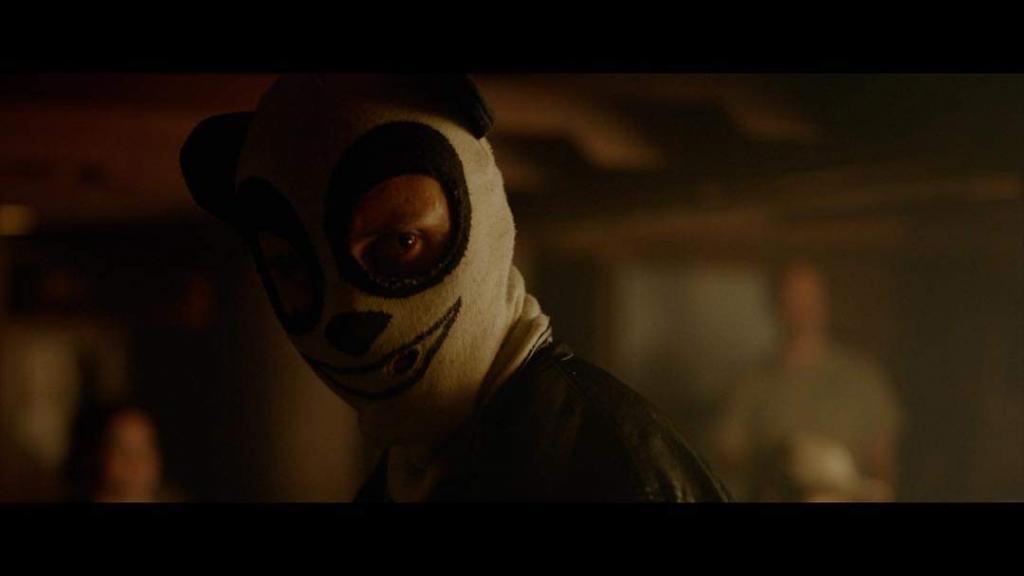On par for the course of this year’s film festivals is actor and filmmaker Trent Dickens, just shy of a decade in the entertainment field and having worn multiple hats on a number of TV and film productions to date. His shortfilm debut now takes shape with Panda, a compelling, almost bewildering character drama at times that isn’t afraid to take a left turn somewhere in its reaffirming symbolic plot points and story tools.
The choice of a panda mask is what intrigues me the most in that whenever I think of pandas, I’m reminded of viral videos of these adorable, playful animals with limited intellect who run amuck an can’t stand or sit still for long periods of time. With Dickens, as he immerses you in much of Mississippi’s dark, dreary, suburban millieu, our Panda (Jordan Salloum) is a grown man with multiple, dangerous addictions. Wherever he goes, the mask is on at all times, which, at the top of the film underscores a near-major dealbreaker with the girlfriend (Krystal Ellsworth).
What ensues for the next half-hour of Dicken’s brooding, cerebral neo-noir is a night of happenstance conflict, psychotropic mystery and cataclysmic self-discovery. A paper bag of money and a suitcase full of drugs are just the beginning as the night unfolds into further uncertainty, from a close call with armed robbers to a fracas with a pusher man known as Shadow (Ed Moore) and being kidnapped and stuck in a truck, to landing in a dive bar and finding himself in drug-fueled haze with a mysterious woman, and lastly, an animal-themed masquerade party with sex, strobe lights, more drugs and rave music underscoring the event.
Actor Jeremy London appears as Marshall, a friend to our main character and really there isn’t much else to his role other than getting high and suffering a concussion. Garnering its more nebulous and often confounding moments, Panda also introduces a young boy on a bicycle (Ayden Ladner) who appears out of nowhere amid some of the most timely of circumstances. At first you think it’s only our lead character who sees him until beyond wondering who he is, you realize others can see him as well. It’s a pivotal element in the film’s framework that induces the palpable notion that not everything is what it seems, and even more so for our mask-wearing anarchist in his already broken, unhinged mental state.
The countlessly beautiful Ellsworth’s role in Panda is especially prevalent by the third act. I’m worried I’ll say too much as there are only so many things one can discuss about a 35-minute movie; It’s a bit of a twist that graces the film’s recapitulation almost brilliantly, particularly when bearing in mind the film’s tagline which reads “We All Wear Masks”. It adds to the film’s often illusory demeanor and makes you wonder if you should approach the narrative at face-value or try and pick it apart to sort the pieces for your own mindset.
I wouldn’t call Panda ostentatious or anything – really it’s just an interesting piece of independent cinema with an assortment of characters that embody the kind of crazy that Panda is meant to observe. Tyler Banks’ score mesmerizes from top to bottom, enhancing Dickens’ vision which comes packaged with impressive performances, and carries enough weight to satisfy you through to the end, and Dickens definitely knows how to play with certain elements and ideas that get you thinking.
Personally, I was left with more questions than answers and I’m certain that a concept like this would warrant more fleshing-out for ideas toward a feature treatment for festivals that may even help fill in some blanks. For now, what you get in Panda, ultimately, is an adventure into mind corrupted by escapism, paranoia and an unraveling sense of entrenched fear of something possibly tangible, and as an idea with a life of its own worth nurturing, it works.
By the end, the messaging and delivery is albeit clear which otherwise redeems Panda for all its plusses. If you don’t try to read too much into its amorphous fixations on cinematic structure, you won’t feel too unencumbered to enjoy it. Point in fact, and provided that Panda isn’t necessarily a one-off, if you’re left just as puzzled as I was – so much so that it warrants a conversation, I think you might be onto something.

